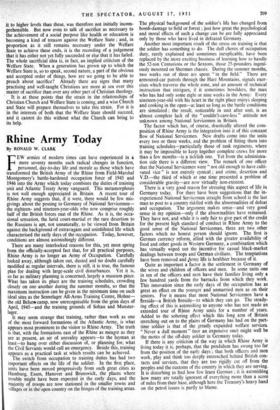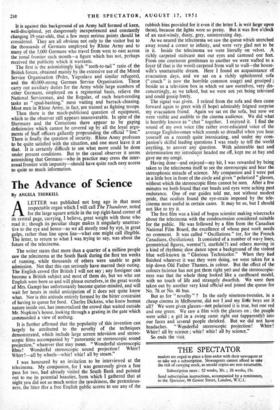Rhine Army Today
By RONALD W. CLARK
FEW armies of modern times can have experienced in a mere seventy months such radical changes in function, personnel, day-to-day life and morale as those which have transformed the British Army of the Rhine from Field-Marshal Montgomery's battle-hardened occupation force of 1945 and 1946 into the Army which today combines the duties of training unit and Atlantic Treaty Army vanguard. This metamorphosis is not well enough appreciated in Britain. A recent tour of Rhine Army suggests that, if it were, there would be few mis- givings about the posting to Germany of. National Servicemen— the eighteen- and nineteen-year-olds who now comprise roughly half of the British forces east of the Rhine. As it is, the occa- sional sensation, the lurid court-martial er the rare desertion to the Russians is apt, not unnaturally, to be viewed from Britain against the background of extravagant and uninhibited life which characterised the early days of the occupation. Today, however, conditions are almost astonishingly different.
There are many interlocked reasons for this, yet most spring from the officially-accepted fact that, for all practical purposes, Rhine Army is no longer an Army of Occupation. Carefully locked away, although taken out, dusted and no doubt carefully modified at regular intervals, there is still, it is true, the famous plan for dealing with large-scale civil disturbances. Yet it is, so far as military planning is concerned, largely a museum piece. What has taken its place are the training schedules, crowding closely on one another during the summer months, so that the maximum instruction can be given in the minimum time on such ideal sites as the Sennelager All-Arms Training Centre, Hohne- the old Belseta camp, now unrecognisable from the grim days of April, 1945—and the training grounds of Soltau and Munster- lager.
It may seem strange that" training, rather than work as one of the most forward formations of the Atlantic Army, is what appears most prominent to the visitor to Rhine Army. The truth is that, with the formations east of the Rhine as meagre as they are at present, an air of unreality appears—to the layman at least—to hang over either discussion of, or planning for, what the Civil Servants would call an emergency. Beside this, training appears as a practical task at which results can be achieved. The switch from occupation to training duties has had two important effects on the life of the soldier. In the first place, units have been moved progressively from such great cities as Hamburg, Essen, Hanover and Brunswick, the places where trouble might have been expected in the early days, and the majority of troops are now stationed in the smaller towns and villages or in the open country on the fringes of the training areas. The physical background of, the soldier's life has changed from bomb-damage to field or forest ; just how great the psychological and moral effects of such a change can be are fully appreciated only by those who have lived in defeated Germany.
Another most important result of the stress on training is that the soldier has something to do. The dull chores of occupation duty, rarely explained and sometimes inexplicable, have been replaced by the more exciting business of learning how to handle the 52-ton Centurions or the Sextons, those 25-pounders ingeni- ously mounted on Sherman chassis. During the summer months, two weeks out of three are spent " in the field." There are armoured-car patrols through the Harz Mountains, signals exer- cises which traverse the whole zone, and an amount of technical instruction that intrigues, if it sometimes bewilders, the man who has had only some eight or nine weeks in the Army: Every nineteen-year-old with his heart in the right place enjoys sleeping and cooking in the open—at least so long as the battle conditions are simulated ; the result, noticeable in unit after unit, is an almost complete lack of the " couldn't-care-less " attitude not unknown among National Servicemen in Britain.
The factor which has, of course, drastically altered the com- position of Rhine Army is the integration into it of this constant flow of National Servicemen. New drafts come into the units every two or three weeks, and the problem of fitting them into training schedules—particularly those of tank regiments, where it may be impossible to keep together complete crews for more than a few months—is a ticklish one. Yet from the administra- tion side there is a different view. The remark of one officer that the-National Servicemen were " not old enough to have culti- vated vice " is not entirely cynical ; and crime, desertion and V.D.—the third of which at one time presented a problem of Considerable gravity—are now virtually non-existent.
There is a very good reason for stressing this aspect of life in Germany today. For there have been suggestions that the in- experienced National Serviceman straight from school is the last man to post to a country riddled with the abnormalities of defeat and occupation. The argument makes sense—and very good sense in my opinion—only if the abnormalities have remained. They have not, and while it is only fair to give part of the credit for the 'present high standard of conduct in Rhine Army to the good sense of the National Serviceman, there are two other factors which no honest person should ignore. The first is German currency reform, allied with the greater availability of food and other goods in Western Germany, a combination which has virtually wiped out the incentive for casual black-market dealings between troops and German civilians. The temptations have been removed and .Army life is healthier because of it. Quite as important a factor is the settlement in Germany of the wives and children of officers and men. In some units one in ten of the officers and men have their families living only a few hundred yards from the barracks from which they work. This innovation since the early days of the occupation has as great an effect on the younger and unmarried men as on their seniors. For it means that most National Servicemen have a fireside—a British fireside—to which they can go. The steady- ing effect of this is astonishing to anyone who has not made an extended tour of Rhine Army units for a number of years. Added to the sobering effect which this long arm of Britain stretching out on to the plains of Germany has had on the part- time soldier is that of the greatly expanded welfare services. " Never a dull' moment " (nor an expensive one) might well be the motto of the off-duty soldier in Germany today. If there is any criticism of the way in which Rhine Army is living today it is, perhaps, that the pendulum has swung too far from the-position of the early days ; that both officers and men work, play and think too deeply entrenched behind British con- tacts and services, that they are too rigidly cut off from the peoples and the customs of the country in which they are serving. It is disturbing to find how few learn German ; it is astonishing how many are totally ignorant of everything more than a score of miles from their base, although here the Treasury's heavy hand on the petrol issues is partly to blame. It is against this background of an Army half formed of keen, well-disciplined, yet dangerously inexperienced and constantly changing 19-year-olds, that a few mote serious points should be considered. They are all obvious not only to the visitor but to the thousands of Germans employed by Rhine Army and to many of the 3,000 Germans who travel from west to east across the zonal frontier each month—a figure which has not, perhaps received the publicity which it warrants. The first is the astonishingly high " teeth-to-tail " ratio of the British forces, obtained mainly by the extensive use of the Mixed Service Organisation (Poles, Yugoslays and similar refugees), and the 40,000-strong German Service Organisation. These carry out auxiliary duties for the Army while large numbers of other Germans, employed on a regimental basis, relieve the National Serviceman, and the Regular, of such heart-rending tasks as " spud-bashing," mess waiting and barrack-cleaning. Most men in Rhine Army, in fact, are trained as fighting troops. Then there is the much-publicised question of equipment, which to the observer still appears unanswerable. In spite of the Shermans and the Centurions there appear to be gaping deficiencies which cannot be covered up by all the loyal argu- ments of Staff officers gallantly propounding the official " line." There is finally the question of security. Rhine Army professes to be quite satisfied with the situation, and one must leave it at that. It is certainly difficult to see what more could be done under present conditions. But to the casual observer it seems astonishing that Germans—who in practice may cross the inter- zonal frontier with impunity—should have quite such easy access to quite so much information.































 Previous page
Previous page